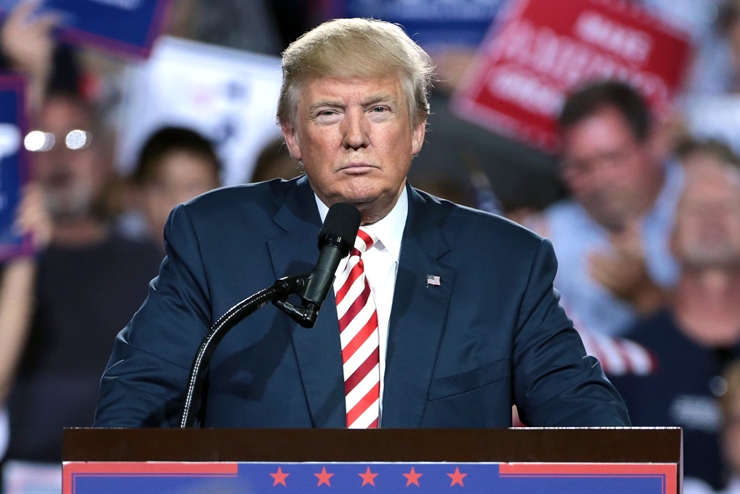Two long established Trump critics have recently berated the President quite differently. One, National Review Editor Rich Lowry, offered constructive criticism of the way Trump has handled himself in the closing weeks of his campaign; the other critic, a National Review Online Founding Editor and syndicated columnist Jonah Goldberg, offered more of the same dyspeptic narrative that he invariably grinds out when on an anti-Trump roll.
According to Lowry, Trump has focused on his own obsessions, not the concerns of average voters. Instead of bringing up the “dubious investigatory decisions from four years ago” that don’t seem to move voters beyond his base, Trump should be driving home his most obvious achievement, which is his economic success. This chief executive, who presided over a huge economic boom before the onset of the pandemic, should be providing a “sustained case against Biden’s economic program.” He should also avoid giving evidence that he doesn’t take the virus seriously, when so many voters do.
Lowry is not suggesting that Trump should not be indignant about what the Democrats in collusion with intelligence services did to him in 2016 and all the phony investigations to which it led. Lowry is also not suggesting that Trump has no right to suspect the Democrats of playing political games with COVID-19. And he is justified in griping to his friends and advisers about how the media have whipped up hysteria over this virus.
According to Lowry, Trump should be showing that “modicum of self-discipline” needed to appeal to swing voters on issues that rightly or wrongly matter to them. Instead Trump is being emotionally self-indulgent. By the way, this last observation would apply even if we agree that it is the predominantly left-wing media that shape public concerns, and they do so partly by ignoring the outrages that were inflicted on Trump. No matter how we got to our present position, however, Trump should be addressing those issues that voters insist are the dominant ones.
In contrast to Lowry’s thoughtful criticism, Goldberg seems to be looking for excuses to slam Trump. In a rambling essay about what “democracy means,” he spends about 800 words explaining why Senator Mike Lee of Utah is right or wrong—it’s not clear what Goldberg’s judgment is in this matter—when he tells us that “America is not a democracy.” Most of Goldberg’s discourse on this subject does not address demanding political theoretical questions seriously. But it does serve the purpose of pushing the reader inexorably toward the concluding paragraph. According to Goldberg, “We should be bolstering faith in democracy, not talking it down.” Further: “Particularly at a moment when many intellectuals are flirting with reactionary alternatives to it and the president is saying that any election result he doesn’t like is proof that the system is rigged.”
Exactly who are these intellectuals “flirting with reactionary alternatives”? Have I been missing something as I watch pictures of Antifa and BLM activists tearing down historical statues, shooting policemen (of all colors), and burning down buildings? Perhaps there is some latter-day Edmund Burke, John C. Calhoun, or Joseph de Maistre mixed in with what look to me, as much as they do to Donald Trump, as radical leftists.
What are the “reactionary” as opposed to radical leftist instruments that intellectuals are pushing right now? Perhaps, Goldberg has in mind some economic nationalist or a defender of biblical family values on the right. If so, are these the folks who wish to pack the Supreme Court, turn the country into a one-party dictatorship, and force feed us anti-white, LGBT gibberish up to our eyeballs? Goldberg is obviously looking in the wrong direction for where the threat to constitutional government is coming.
Finally, whatever Goldberg may consider “bolstering faith in democracy,” it’s not clear that Donald Trump is undermining that faith because “he is saying that any election result he doesn’t like is proof that the system is rigged.” In fact, I don’t recall Trump ever saying that. What he has complained about—in admittedly jumbled syntax—is a perfectly legitimate grievance, which is using unsolicited ballots to obtain votes that will determine the outcome of the presidential race. Democratic governors favor this device, for obvious reasons, especially when they can depend on Democratic vote harvesters on the other end to help fill out and then return the ballots.
Exactly why does Goldberg object to Trump’s raising this point, particularly after evidence of voter fraud with unsolicited ballots has turned up more than once? Would it not be a greater threat to an orderly constitutional system to allow such abuses to go unnoticed? It may also be more than an accident that when Goldberg mentions those forces undermining whatever he decides to call the American system he can’t bring himself to mention such obvious examples as mobs rioting in the streets and committing murder and mayhem. Perhaps as in the case of Joe Biden, for Goldberg Antifa is just “an idea.”
Image Credit:
above: Donald Trump speaking with supporters at a campaign rally at the Prescott Valley Event Center in Prescott Valley, Arizona. [Image by: Gage Skidmore, CC BY-SA 2.0 , via Wikimedia Commons, cropped and resized]



Leave a Reply